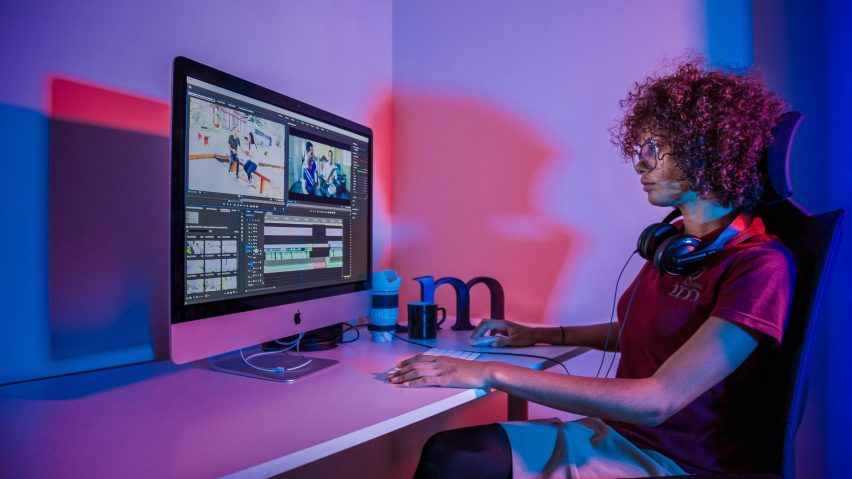The demands placed on architecture students is leading to burnout, mental-health issues and even thoughts of suicide, according readers participating in a social-media discussion about design education organised by Dezeen.
The #dezeenchat held on our Twitter and Instagram accounts earlier this month saw readers express concern about the long-hours culture of architecture education, where "sleep is for the weak".
Responding to the question "Is design education broken?" readers also highlighted a number of issues that are proving barriers to entry or learning, including high course-fees, the cost of materials, and oversubscribed courses.
"I watched friends burn out and lose days to recovery"
However the overwhelming complaint was of a culture of burnout, where students are instructed to work long hours and cut down on sleep, with no support offered for those who said they were struggling.
"Some professors say that, as an architecture student, all-nighters should be common practice," said Instagram user Rafay Qazi, saying one professor told them "sleep is for the weak".
"I watched friends burn out and lose days to recovery, and this cannot continue," tweeted Scott McAulay, an architecture graduate of the University of Strathclyde in Scotland. "Suffering is no 'rite of passage'."
#dezeenchat I’ve had a professor say that we must pull all nighters for him because architecture school is a 24/7 job and that we can “get a day job” when we graduate https://t.co/zHxeKetk6F
— elizabeth🇻🇦 (@elizabethgrav1) July 4, 2019
Burnout, according to the recently updated definition from the World Health Organisation, affects those exposed to chronic stress that hasn't been properly managed.
"I've had a professor say that we must pull all nighters for him because architecture school is a 24/7 job and that we can 'get a day job' when we graduate," added Elizabeth, an architecture major from Sacramento in the US.
"I seriously considered suicide on an almost daily basis"
As well as burnout, Dezeen readers reported becoming isolated from their support networks during term time, breakdowns due to stress and lack of sleep, and even thoughts of suicide.
"I have been told to expect to work in the studio 10 - 14 hours per day on top of my other class time, home work, my job, and my commute. I have in so many words been told not to expect to see friends or family during the school term," said N. L. Flowers, an architecture student at Portland State University in the US.
I overheard two different students in studio on three separate occasions casually discuss killing themselves. I myself seriously considered suicide on an almost daily basis while in studio. #dezeenchat
— N. L. Flowers (@n2arkitektur) July 4, 2019
"I overheard two different students in studio on three separate occasions casually discuss killing themselves. I myself seriously considered suicide on an almost daily basis while in studio," Flowers added.
Architect Ben Channon, founder of the Architects' Mental Wellbeing Forum said he often speaks to students with concerns about their mental health.
"Sadly there still seems to be an embedded culture of late nights and students not being treated with the respect they deserve at many universities," said Channon.
"Institutions perpetuating student exhaustion shame our industry"
Insisting on long and late hours, readers pointed out, makes the industry ultimately less diverse.
"These practices disproportionately prevent students with families and students with physical or cognitive differences from participating or succeeding in architectural education," said Twitter user Cynarcharlie.
Mhairi McVicar, a supervisor at the Welsh School of Architecture, highlighted that this culture in education often translates directly to unhealthy working environments.
"24/7 working is outdated and sets precedents for acceptance of unpaid overtime in practice," said McVicar.
"I advise students to have a life/work balance and a life outside studio. Where else are they expected to find inspiration and energy for creative work?"
24/7 working is outdated and sets precedents for acceptance of unpaid overtime in practice. As an educator, I advise students to have a life/work balance and a life outside studio: where else are they expected to find inspiration and energy for creative work? #dezeenchat
— Mhairi McVicar (@mhairimcvi) July 4, 2019
Seeing the comments on #dezeenchat, some educators and industry leaders condemned burnout culture and pledged to change it.
"On the sleepless thing and other abhorrent behaviour #dezeenchat can I say that those institutions perpetuating exhaustion in any student bring shame on our industry," said Deborah Dawton, chief executive of the Design Business Association.
"We must work together to eliminate machismo behaviour in schools of architecture. A more diverse profession will only come when we support #WorkLifeBalance," said Ben Derbyshire, president of the Royal Institute of British Architects.
"I produced my best works late at night"
Sheffield School of Architecture's Future Practice platform agreed, advising design departments to not "have 24 hour studio culture" and "encourage life work balance" for students.
"If you don't participate in everyday life how can you design for it!" they asked.
Some chat participants, however, reported that they found the method of being pushed to their physical and emotional limit in an educational environment ultimately rewarding.
"24/7 studio culture is what makes design education unique," said Subhay Baberwal, an architect based in India. "Even the ones that complain about it, recall the best moment and memories were during the conjuring hours of night with everyone around helping one another."
Hisan Waheed, an architect based in the Maldives, said her "best works were produced while working late into the night, finally dropping dead on the studio floor the following morning."
Main photo is by Matias Islas on Unsplash.
In the UK, Samaritans can be contacted on 116 123. In the US, the National Suicide Prevention Lifeline is 1-800-273-8255. In Australia, the crisis support service Lifeline is 13 11 14. Other international suicide helplines can be found at befrienders.org.

